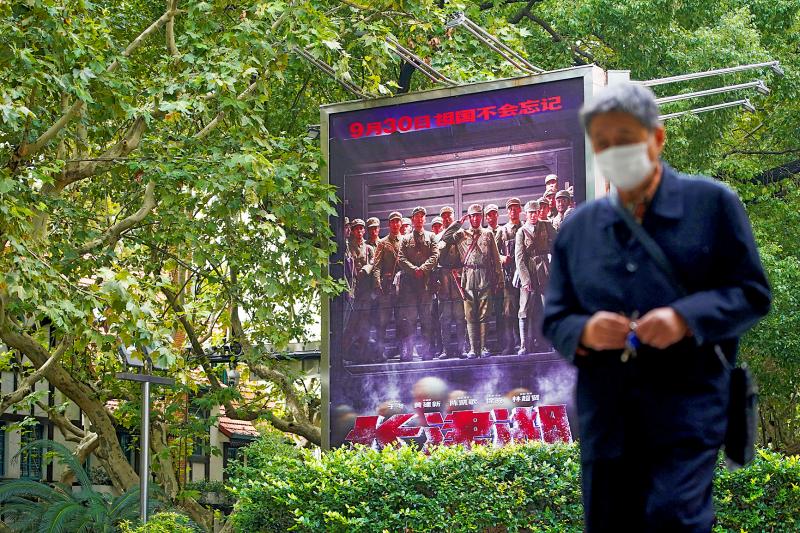A Chinese-made Korean War epic has topped the global box office, tapping a vein of rising patriotism in China and prompting moviegoers to post videos of themselves eating frozen potatoes to emulate the hardships endured by soldiers in the conflict.
The Battle at Lake Changjin (長津湖), released to coincide with China’s Oct. 1 national holiday, had grossed nearly 5 billion yuan (US$779.13 million) by Tuesday, according to data compiled by Lighthouse, a box office tracker owned by Alibaba Pictures.
That puts it ahead of current global blockbusters including the latest 007 film, No Time To Die, and Marvel’s Shang-Chi and the Legend of the Ten Rings, according to IMDb-backed movie data Web site Box Office Mojo, and makes it the biggest-grossing war film ever, overtaking Christopher Nolan’s Dunkirk, which took in US$526.9 million.

Photo: Reuters
Having premiered 20 days ago, the three-hour-movie currently accounts for half of all films being shown in Chinese cinemas, according to Lighthouse. It was made with the support of the central government’s propaganda department, according to state news agency Xinhua.
Starring Wu Jing (吳京), who directed and played the lead role in Wolf Warrior (戰狼), another nationalistic Chinese blockbuster, the film depicts Chinese soldiers battling the much-better equipped US troops during the bitter cold of the 1950-1953 war.
The conflict ended in an armistice rather than a peace treaty, leaving US-led UN forces technically still at war with North Korea.
The movie, which cost US$200 million, is the latest in a series of patriotic titles China has churned out in recent years.
The film has been embraced by official media, and a former journalist was arrested by police for suggesting on a social media platform that the soldiers frozen to death in the movie had been foolish.
One scene in the movie shows soldiers chewing frozen small potatoes between battles while their US counterparts feast on Thanksgiving turkey.
Some cinemas have distributed frozen potatoes to audiences before the movie, according to videos on Douyin, the Chinese version of TikTok, with many showing moviegoers eating them or the fried flour that was also eaten by Chinese soldiers.
A young woman in one such video cried after the first bite, saying it was impossible to eat.
“The frozen potatoes they ate give us the good life we have today,” another Douyin user said.
Peking University professor Zhang Yiwu (張頤武) said the increasing popularity of local films posed a challenge to Hollywood’s efforts to gain share in China’s movie market. “Hollywood’s movie industry produced one standard product for global audiences in the past, but they might have to learn how to cater to the Chinese market,” Zhang said.

Taiwan doesn’t have a lot of railways, but its network has plenty of history. The government-owned entity that last year became the Taiwan Railway Corp (TRC) has been operating trains since 1891. During the 1895-1945 period of Japanese rule, the colonial government made huge investments in rail infrastructure. The northern port city of Keelung was connected to Kaohsiung in the south. New lines appeared in Pingtung, Yilan and the Hualien-Taitung region. Railway enthusiasts exploring Taiwan will find plenty to amuse themselves. Taipei will soon gain its second rail-themed museum. Elsewhere there’s a number of endearing branch lines and rolling-stock collections, some

The Democratic Progressive Party (DPP), Chinese Nationalist Party (KMT), and the country’s other political groups dare not offend religious groups, says Chen Lih-ming (陳立民), founder of the Taiwan Anti-Religion Alliance (台灣反宗教者聯盟). “It’s the same in other democracies, of course, but because political struggles in Taiwan are extraordinarily fierce, you’ll see candidates visiting several temples each day ahead of elections. That adds impetus to religion here,” says the retired college lecturer. In Japan’s most recent election, the Liberal Democratic Party lost many votes because of its ties to the Unification Church (“the Moonies”). Chen contrasts the progress made by anti-religion movements in

Could Taiwan’s democracy be at risk? There is a lot of apocalyptic commentary right now suggesting that this is the case, but it is always a conspiracy by the other guys — our side is firmly on the side of protecting democracy and always has been, unlike them! The situation is nowhere near that bleak — yet. The concern is that the power struggle between the opposition Chinese Nationalist Party (KMT) and their now effectively pan-blue allies the Taiwan People’s Party (TPP) and the ruling Democratic Progressive Party (DPP) intensifies to the point where democratic functions start to break down. Both

This was not supposed to be an election year. The local media is billing it as the “2025 great recall era” (2025大罷免時代) or the “2025 great recall wave” (2025大罷免潮), with many now just shortening it to “great recall.” As of this writing the number of campaigns that have submitted the requisite one percent of eligible voters signatures in legislative districts is 51 — 35 targeting Chinese Nationalist Party (KMT) caucus lawmakers and 16 targeting Democratic Progressive Party (DPP) lawmakers. The pan-green side has more as they started earlier. Many recall campaigns are billing themselves as “Winter Bluebirds” after the “Bluebird Action”